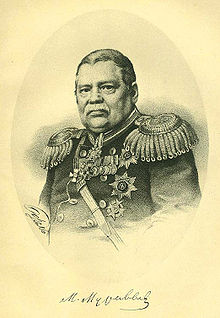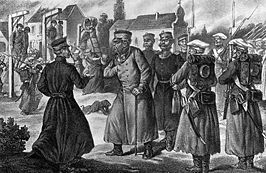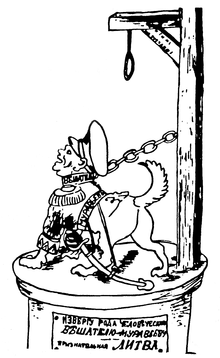- Mikhail Muravyov-Vilensky
-
Count Mikhail Nikolayevich Muravyov (Михаи́л Никола́евич Муравьёв; 1796-1866) was one of the most reactionary Russian imperial statesmen of the 19th century. He should not be confused with his grandson, Mikhail Nikolayevich Muravyov, who served as Russian Foreign Minister between 1897 and 1900.
Contents
Early years
During his years at the University of Moscow, Muravyov set up the Mathematical Society, of which he would later become president. He volunteered during the Patriotic War of 1812 and was wounded at Borodino. In 1816 he became a co-founder of the first Decembrist societies and, although he didn't actively participate in the movement after 1820, he was briefly apprehended by the police after their failed uprising in December, 1825.
Upon the intercession of his high-placed relatives, Muravyov was appointed Vice-Governor of Vitebsk (1826) and Governor of Mogilyov (1828). At these posts, he became known for his harsh policy of Russification. He instituted a complete ban on Latin alphabet and the Lithuanian language printed matter. The ban was lifted only in 1904.
Muravyov's experiences during the November Uprising in 1830 persuaded him that two principal agents responsible for the spread of the Polish nationalism were the Roman Catholic priests and the Polish students. As a consequence, he made it his priority to close the Vilnius University and to expel Catholic priests from other educational facilities. He was reported as saying that "what Russian rifle did not succeed in doing, will be finished off by Russian schools".
In 1831 Muravyov governed Grodno, only to be moved to Minsk the following year. In 1850, he was made a member of the State Council of the Russian Empire. In the 1850s he served as Vice-President of the Russian Geographical Society. Alexander II appointed him Minister of State Properties, a position which Muravyov used to lead the reactionary party opposed to the emancipation of the serfs. His administration of state-owned peasant households proved catastrophic and effectively reduced many of them to bankruptcy.
Northwestern Krai Governor General
During the Polish-Lithuanian January Uprising of 1863, Muravyov was appointed Governor General of Northwestern Krai (former Grand Duchy of Lithuania, now Lithuania and part of Belarus). He promptly subdued the rebellion, burning or resettling whole Polish and Lithuanian villages to Siberia and devolving attendant expenses on the Catholic clergy. About 9000 people were resettled, 127 hanged. Konstanty Kalinowski, Zygmunt Sierakowski and Antanas Mackevičius were amongst the many local patriots executed on his orders. Those settlements where the rebels were reported had to pay enormous contributions. As a consequence, Muravyov became known as the "hangman of Vilnius" for Lithuanians, Belarusians and Poles[1]; even in modern Polish historiography he is sometimes referred to by his contemporary nickname, 'Wieszatiel' (russified Polish for 'hangmen'). To many nationally minded Russians, who resented Alexander II's refusal to fully support the nationalist cause, Muravyov was a hero and the de facto head of the "Russian Party". They flooded Muravyov with congratulatory telegrams on his nameday, November 8, 1863, a form of public expression previously unknown in Russia [1].
On May 1, 1865 Muravyov was relieved from his duties. For his vital services to the Empire, he received a comital title and spent late 1865 and early 1866 writing his memoirs. At the time of his death Muravyov was investigating Dmitry Karakozov's attempt to assassinate the tsar.
Contemporary reactions
In the long term, Muravyov's policy proved mixed. In 1905 Polish rebellion once again took place against Russian Empire. He was however instrumental in rooting out Roman Catholicism in Belarus, prohibiting construction of new churches and converting the existing ones to Eastern Orthodox chapels. Muravyov justified his russification policies by claiming that Polish and Lithuanian administration undertook polonization measures.
Assessment of Muravyov's activity by the educated strata of the Russian society varied from enraptured odes by Fyodor Tyutchev to caustic satires by Nikolai Nekrasov. After the suppression of the 1863 uprising, the celebrated emigre writer Alexander Herzen, whose influence on the Russian public opinion had been fatally damaged by his support for the rebels, bitterly joked that Muravyov should replace Alexander II on the throne as a more consistent and forceful nationalist. In Poland and Lithuania he has been viewed as a personification of tsarist repression and Russification.
Notes
- ^ Snyder, Timothy. Reconstruction of Nations : Poland, Ukraine, Lithuania, Belarus, 1569-1999.. Yale University Press. p. 49. ISBN 0300095694.
- ^ See A.N. Mosolov, "Vilenskie ocherki", in Russkaia starina no. 11, 1883, p. 405. quoted in Mikhail Dolbilov, "We are at one with our tsar who serves the Fatherland as we do: The Civic Identity of Russifying Officials in the Empire's Northwestern Region after 1863" [2]
References
- Adam Bruno Ulam, Prophets and conspirators in prerevolutionary Russia, Transaction Publishers, 1998, Google Print: p.8
External links
- (Polish) Muravyov Diaries, scan of first Polish edition, 1916
Categories:- Senators of the Russian Empire
- 1796 births
- 1866 deaths
- Politics of the Russian Empire
- Russian nobility
- History of the Lithuanian language
- Members of the State Council of the Russian Empire
- Russian people of the January Uprising
- Recipients of the Order of St. Andrew
Wikimedia Foundation. 2010.



